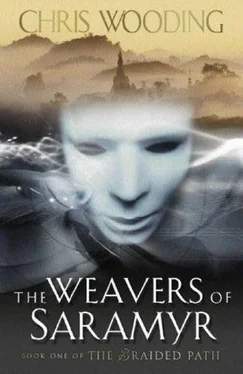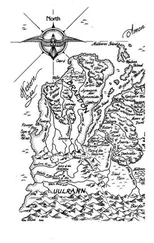Chris Wooding - Weavers of Saramyr
Здесь есть возможность читать онлайн «Chris Wooding - Weavers of Saramyr» весь текст электронной книги совершенно бесплатно (целиком полную версию без сокращений). В некоторых случаях можно слушать аудио, скачать через торрент в формате fb2 и присутствует краткое содержание. Жанр: Фэнтези, на английском языке. Описание произведения, (предисловие) а так же отзывы посетителей доступны на портале библиотеки ЛибКат.
- Название:Weavers of Saramyr
- Автор:
- Жанр:
- Год:неизвестен
- ISBN:нет данных
- Рейтинг книги:5 / 5. Голосов: 1
-
Избранное:Добавить в избранное
- Отзывы:
-
Ваша оценка:
- 100
- 1
- 2
- 3
- 4
- 5
Weavers of Saramyr: краткое содержание, описание и аннотация
Предлагаем к чтению аннотацию, описание, краткое содержание или предисловие (зависит от того, что написал сам автор книги «Weavers of Saramyr»). Если вы не нашли необходимую информацию о книге — напишите в комментариях, мы постараемся отыскать её.
Weavers of Saramyr — читать онлайн бесплатно полную книгу (весь текст) целиком
Ниже представлен текст книги, разбитый по страницам. Система сохранения места последней прочитанной страницы, позволяет с удобством читать онлайн бесплатно книгу «Weavers of Saramyr», без необходимости каждый раз заново искать на чём Вы остановились. Поставьте закладку, и сможете в любой момент перейти на страницу, на которой закончили чтение.
Интервал:
Закладка:
Jin appeared to consider that for a time. 'We should stay here,' she said at length. 'The shin-shin will be waiting for us if we emerge before dawn.'
'I think she has the same idea,' Tane said, motioning with his eyes towards the great furred bulk that blocked them in.
The bear lay in front of their hollow throughout the night, and in spite of their discomfort the two of them slept. Jin's dreams were of fire and a horrible scorching heat; Tane's, as always, were of the sound of footsteps approaching his bedroom doorway, and the mounting terror that came with them.
Eight
Weave-lord Vyrrch shuffled along the corridors of the Imperial Keep, his hunched and withered body buried in his patchwork robes, his ruined face hidden behind the bronze visage of an insane and ancient god. Once he had walked tall through these corridors, his stride long and his spine straight. But that was before the Mask had twisted him, warped him from the inside. Like all the True Masks, its material was suffused with the essence of witchstone, and the witchstones gave nothing without taking something away. His body was thronged with cancers, both benign and malignant. His bones were brittle, his knees crooked, his skin blemished all over. But such was the price of power, and power he had in abundance. He was the Weave-lord, the Empress's own Weaver, and he wanted for nothing.
The Weavers were a necessity of life in the higher echelons of Saramyr society. Through them, nobles could communicate with each other instantly over long distances, without having to resort to messengers. They could spy on their enemies, or watch over their allies and loved ones. The more effective Weavers could kill invisibly and undetectably, a convenient way to remove troublesome folk; the crime could only be traced by another Weaver, and even then there were no guarantees.
But the most important role of a Weaver was as a deterrent; for the only defence against a Weaver was another Weaver. They were there to stop their fellows spying on their employers, or even attempting to kill them. If one noble had a Weaver in their employ, then his enemies must have one to keep themselves safe. And so on with their enemies, and theirs. The first Weavers had begun to appear around two and a half centuries ago, and in the intervening
time they had become a fixture of noble life. Not one of the high families lacked a Weaver; to be without one was a huge handicap. And while they were widely reviled and despised even by their employers, they were here to stay.
The price paid to acquire a Weaver was steep indeed, and the employer never stopped paying till the Weaver died. Money was an issue, of course; but that money was not paid to the Weavers themselves, but to the Edgefathers in the temples, for they made the Masks that the Weavers wore, and such was the purchase price of the Mask. For the Weaver, there was only this: that whatever comfort he sought would be attended to, every need fulfilled, every whim satisfied. And that he would be cared for, when he could not care for himself.
Weaving was a dangerous business. The Weavers brushed close to madness each time they used their powers, and it took years of training to deal with the energies inherent in their Masks. The Masks were essentially narcotic in effect. The sublime delights of the Weave took the mind and body to a dizzying high; but when the Weaver returned to himself, there was a corresponding backlash. Sometimes it manifested itself as a terrible, suicidal depression; sometimes as hysteria; sometimes as insane rage or unquenchable lust. Each Weaver's needs were different, and each had different desires that had to be satisfied lest the Weaver turn on himself. No employer wanted that. A dead Weaver was merely a very expensive corpse.
The Weavers were mercenaries, selling their services to the highest bidder. To their credit, once bought they were loyal; there had never been a case of one Weaver defecting to another family for a higher price. But all owed a higher loyalty, and that was to Adderach, the great mountain monastery that was the heart of their organisation. The Weavers would do anything and everything for their employers, even kill other Weavers – it was hard to maintain a conscience in the face of the atrocities they committed in their post-Weaving periods – but they would not compromise Adderach or its plans. For Adderach was the greatest of the monasteries, and the monasteries kept the witchstones, and without the witchstones the Weavers were nothing.
Vyrrch reached the door to his chambers, which were high up at the south end of the Keep. He encountered few people here. Though there were servants within calling distance whose job it was to satisfy whatever desire took him, they had learned that it was safer to stay out of his way unless needed. Vyrrch's preferences were unusual, but then it was common for a Weaver's requests to become more random and bizarre as the insanity took hold.
He had become increasingly paranoid about theft of his belongings one summer, convinced that whispering figures were conspiring to strip his chambers of their finery. He gnawed on his thoughts until he had reached the point of mania, and several servants were executed for stealing things which had never existed in the first place. After that, he declared that no servant would be allowed to enter his chambers; they were accessible by only one door, which was kept locked, and he was the sole owner of a key. Beyond that door was a network of rooms in which no servant had trodden for several years now.
He drew out the heavy brass key from where it hung around his scrawny white neck, and unlocked the massive door at the end of the corridor. With a heave, he pushed it open. A moment later, something darted out and shot past his feet. He whirled in time to see a cat, its fur in burned patches, racing away down the corridor. A momentary frown passed beneath the still surface of his Mask. He did not even remember asking for a cat. He wondered what he had done to it.
He stepped into the dim chambers, closed and locked the door behind him. The stench coming from within was imperceptible to him; it was the smell of his own corrupted flesh, mixed with a dozen other odours, equally foul. The light from outside was muted by layers of hung silks, now besmirched by dust and hookah smoke, making the rooms gloomy even at midday. He shuffled into the main chamber, where the octagonal bathing pool was. Vyrrch had rid it of its centrepiece of a drowned, naked boy by ordering a tank full of scissorfish and dumping them in the pool. They made short work of the boy, and later of each other, but now the water was dark red and chunks of flesh floated in it. The decayed lump that shared his broken bed was still there, he noted with distaste. It was beginning to offend him. He would do something about it soon. For now, though, he had a more important task of his own.
The Empress was facing the council on the morrow. It was a dangerous time for her, and potentially ruinous to Blood Erinima. The nobles and high families had assessed the Lucia situation by now; they had formed into alliances, struck deals. They were ready with threats which they were fully prepared to deliver, ready to declare their intentions regarding Lucia's claim to the throne: support, or opposition.
Vyrrch had spent the last few days relaying communiques between Blood Erinima's allies, of which there were more than he expected. The news that Lucia's Aberration was not overtly dangerous, nor outwardly visible, had gentled the storm somewhat, and many of Blood Erinima's staunchest friends had opted to stand by them. Even Blood Batik, the line to which Anais's husband belonged, had given their support, despite Durun's obvious abhorrence to the child. They believed the tradition of inheritance by blood should be adhered to. Other, smaller familes, seeking the opportunity of raising themselves, had also shown their colours in Lucia's defence. They hoped that allying themselves to the Empress in her time of need would win them reward and recognition.
Читать дальшеИнтервал:
Закладка:
Похожие книги на «Weavers of Saramyr»
Представляем Вашему вниманию похожие книги на «Weavers of Saramyr» списком для выбора. Мы отобрали схожую по названию и смыслу литературу в надежде предоставить читателям больше вариантов отыскать новые, интересные, ещё непрочитанные произведения.
Обсуждение, отзывы о книге «Weavers of Saramyr» и просто собственные мнения читателей. Оставьте ваши комментарии, напишите, что Вы думаете о произведении, его смысле или главных героях. Укажите что конкретно понравилось, а что нет, и почему Вы так считаете.












